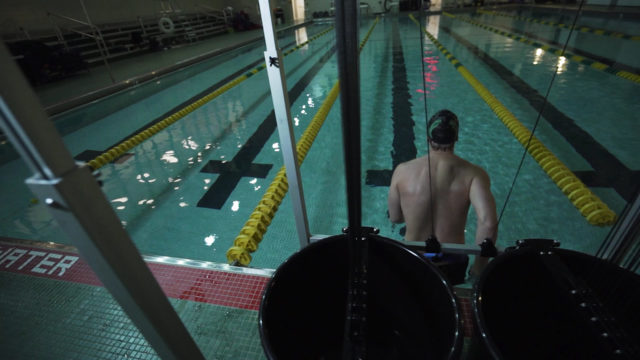Destro Machines is trying to do their part to help swimmers continue training through the shutdowns by offering steep discounts on our products. We are offering a $200 discount on the purchase of a Destro Machines Swim Tower or Double tower, now through June 1st.
In order to ensure that swimmers who are lucky enough to have a pool can train safely and effectively, we have created the following video to help coaches and athletes understand why they need to be cautious when swimming in short pools utilizing tethers. The detrimental effects can be severe and long lasting.
For those of you who are interested in further explanation of the fluid dynamics equations found in the video, we have explained below.
Fluid Dynamics Drag Equation: FD=1/2 ρV 2 A*CD
- FD is the drag force
- CD is the coefficient of drag (fixed relationship between our arm and the H2O)
- A is the area of arm that acts against the H2O (A function of our arm size and technique)
- V is the velocity of the arm relative to the H2O
- ρ is the density of the H2O (This is a constant)
When we pull our arm through the water, we generate a drag force described by the equation above, this drag force is what propels us down the pool. Next, we will remove all of the variables which we cannot change to produce a proportional equation which can help us understand how to train better.
Simplified Equation for Propulsion: FP ≈ (v2 – v1)2 A
- v2 is the velocity of our arm through the water
- v1 is the swimming speed of our swimmer
- A is the area of arm that acts against the H2O (A function of our arm size and technique)
This simplified equation shows us that as we decrease the speed of the swimmer to zero by using the tether; we will increase Fp. This drastic increase in Fp is why coaches and athletes need to be careful not to exceed their limits. Exceeding pulling limits frequently or for sustained periods of time can cause techinque breakdown, injuries, and slower swimming times.
“I graduated from Purdue University in 2014 as a mechanical engineer and swimmer. I was lucky enough compete against and practice with some of the best athletes in the world at the 2012 & 2016 U.S. Olympic Trials, and NCAA Div I Championships. Afterwards, I spent several years as a machine designer in automotive and manufacturing facilities. What I learned is that making an athlete is a lot like making a machine. When we build a machine, we use exact measurements, designs, plans, schedules, and conduct trials. After each revision, we quantify performance and make the appropriate changes until we have the perfect performance. This is how swimmers should be training, but we don’t yet have the technology available to train this effectively. I founded Destro Machines so that I could develop the tools our sport needs to escape the dark ages of training. It is my promise to develop the best training technology that the swimming world has ever seen. Machines aren’t just what we make, Machines are who we make.”
― Chuck Destro, Co-Founder
About Destro Machines
Destro Machines is a family and swimmer owned company. We were founded in 2015 when we realized that swimmers and coaches were lacking the effective and affordable training technology required for them to reach their goals. Our team of engineers, has spent years working with Division I College and top tier highschool programs to develop equipment that’s not only less expensive, but also more effective than any other resistance training system available.

Courtesy: Destro Machines, a SwimSwam partner.


